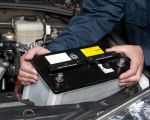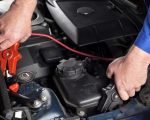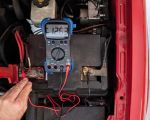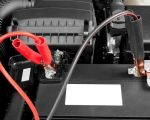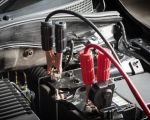How to Protect Your Car Battery from Getting Drained
As a car owner, there’s nothing more frustrating than a dead battery, especially when you’re in a rush. If you’ve ever been stranded on the side of the road because your car battery died, you know just how inconvenient and stressful it can be. Through personal experience, I’ve learned that preventing a battery drain is key to avoiding those headaches. In this article, I’ll share practical tips on how to protect your battery from getting drained, ensuring that you’re always ready to go when you need to hit the road.

Pick Your Part - Help Yourself
1232 Blinn Ave, Wilmington, CA 90744, USA
1. Understanding the Common Causes of Battery Drain
Before we dive into how to protect your car battery, it’s important to understand what typically causes a car battery to drain. Knowing these causes can help you avoid situations where your battery may be at risk. There are a variety of reasons a battery can lose its charge, but the most common ones include:

Pick Your Part - Greer
13054 E Wade Hampton Blvd, Greer, SC 29651, USA
1.1. Leaving Electronics On
One of the easiest ways to drain your car’s battery is by leaving electronics on when the car is off. Whether it’s leaving your headlights, radio, or GPS running, these devices can quickly use up the battery's charge. The same goes for leaving your interior lights on overnight. In my early driving days, I once left the headlights on while parked in a remote area, and the next morning I couldn’t start my car. It was a frustrating lesson on how easily battery drains happen!
1.2. Faulty Alternator
Your car’s alternator is responsible for keeping the battery charged while the engine is running. If the alternator starts to fail, the battery won’t get the charge it needs, and eventually, it will drain. I learned this lesson the hard way when my car suddenly wouldn’t start, only to find out the alternator had gone bad. Keeping an eye on your car’s charging system is crucial for avoiding this issue.
1.3. Extreme Temperatures
Both hot and cold temperatures can affect your battery’s performance. In colder climates, the battery’s chemical reactions slow down, making it harder to start your car. Conversely, high temperatures can cause the battery fluid to evaporate, leading to permanent damage. Living in an area with extreme weather, I’ve had to adjust my car’s maintenance routine to ensure the battery stays protected from the elements.
2. Practical Tips to Protect Your Car Battery
Now that we understand the causes of battery drain, let’s explore some effective strategies to help protect your car battery and extend its lifespan.
2.1. Regularly Check and Maintain Your Battery
One of the most important steps in battery maintenance is checking the battery regularly for any signs of corrosion or leaks. Keeping your battery clean can help improve its performance. A simple cleaning with a baking soda and water solution can prevent buildup of corrosion around the terminals, which could prevent the battery from charging properly. I make it a habit to check the battery twice a year to avoid any nasty surprises.
2.2. Turn Off All Electronics When You Exit Your Car
As tempting as it is to leave your phone plugged into the car charger or keep the radio running when you’re parked, these electronics can quickly drain the battery. Always double-check that your car’s lights, radio, and accessories are turned off when you leave the vehicle. I’ve made a checklist for myself to ensure that nothing is left running when I step out of the car. It’s a simple practice that can save a lot of stress down the road.
2.3. Drive Regularly to Keep the Battery Charged
If you don’t drive your car regularly, the battery may not get the charge it needs, especially in the winter months. Even a short trip can help keep the battery topped off. In my case, I once went a week without driving my car, and the battery was too weak to start the engine when I needed it. A quick 20-minute drive around the block can make a huge difference in maintaining your car’s battery health.
2.4. Install a Battery Insulator
In colder climates, a battery insulator can protect the battery from extreme cold by keeping it at a more consistent temperature. This simple addition can make a world of difference in ensuring that your car starts when you need it most. I installed a battery insulator on my car during a particularly cold winter, and I noticed a significant improvement in my car’s starting power, even in freezing temperatures.
3. What to Do if Your Battery Dies Despite Precautions
Even with all the precautions in place, there’s still a chance that your battery could die unexpectedly. In these cases, having a reliable jumpstart service or towing company on hand is crucial. If you find yourself with a dead battery, don’t panic—there are several solutions to help get you back on the road quickly.
3.1. Use a Jumpstarter
If you’re stranded and can’t get your car started, using a portable jumpstarter can be a lifesaver. These devices are compact, easy to store, and can provide enough power to start your car even if the battery is completely dead. I’ve used a jumpstarter before, and it’s great to have one on hand in case of emergencies, especially when you’re out in a remote area with no one around to help.
3.2. Call for Professional Help
If a jumpstart isn’t enough to get your car running, or if you suspect there’s an issue with your battery or alternator, calling for professional towing and battery assistance is the next best step. Local towing companies often offer emergency jumpstarts and can tow your car to the nearest repair shop if necessary. I’ve had to rely on local towing services a few times, and their fast response made all the difference when my car battery failed unexpectedly.
4. Conclusion
Maintaining your car battery and taking steps to protect it from draining is essential to avoid unexpected breakdowns. Regular maintenance, turning off electronics, and driving your car regularly are simple ways to keep your battery in good shape. However, in the unfortunate event that your battery does die, having a jumpstarter or knowing when to call for professional help can save you a lot of time and stress. Stay proactive with your car’s battery health, and you’ll avoid unnecessary headaches down the road.














